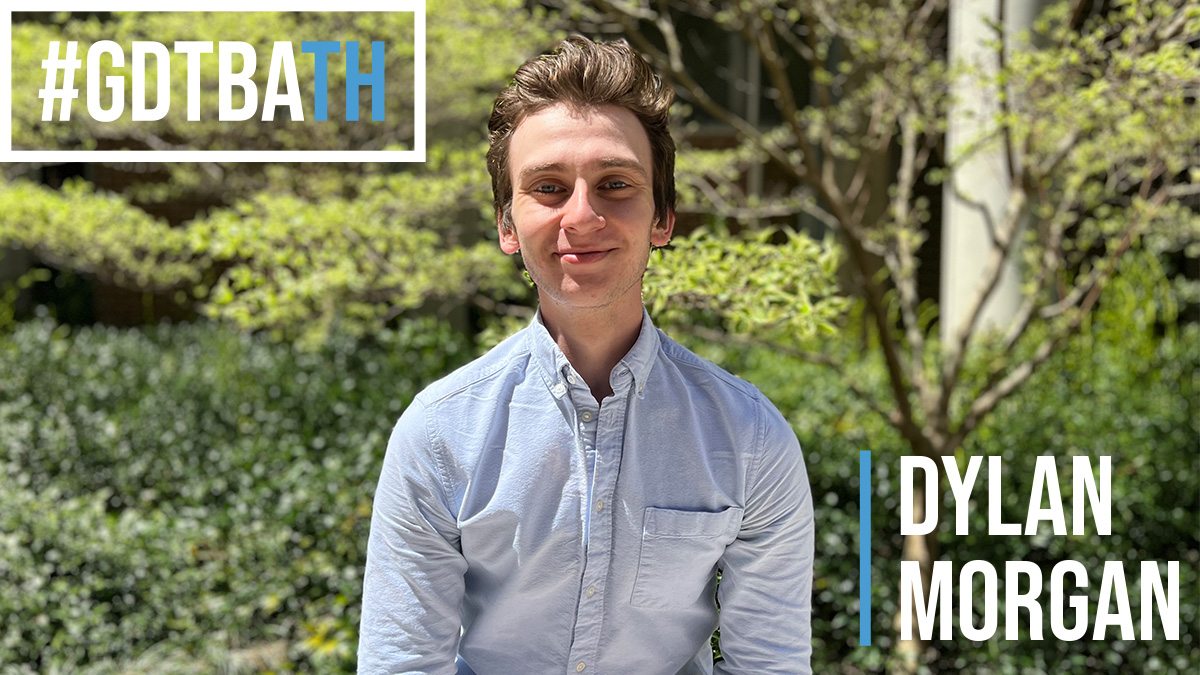#GDTBATH: Dylan Morgan
Carolina senior Dylan Morgan has always had a strong connection with nature and he turned to UNC Institute for the Environment and the North Carolina Policy Collaboratory as a Tar Heel to gain the skills and experience to turn that connection into a career.

Dylan Morgan has always felt a connection to nature. It’s something that he’s shared with this dad since he was a kid.
“He’s also an outdoorsman, and he’s a woodworker, so it’s something that he probably instilled in me without even trying to — just with the amount of time we spent together outside,” said Morgan, a senior at Carolina. “It goes back to this understanding that [nature] has been here longer than civilization has, and there’s a beauty to it, there’s a purity to it.”
Morgan’s love for the outdoors also led to a mission to preserve it and limit human damage to the spaces he values most. Building a career around that passion was his goal when he arrived at Carolina from Charlotte, North Carolina, to study environmental science, but like many college students, finding the direct path to making that impact wasn’t clear.
First, he thought about journalism and environmental science communications, then biology and lab research, followed by public engagement work. Through experiences at the UNC Institute for the Environment and the North Carolina Policy Collaboratory, Morgan found his place in ecology, data science and geographic information systems and acquired the tools he was looking for to make a difference.
“I feel like the ecology and natural resources concentration fit more with my lifelong interest in nature,” he said. “It’s just something that fits more with what I appreciate with nature and conservation.”
In the spring semester of his first year at Carolina, while still determining what role he wanted to take in environmental science, Morgan met with Susan Cohen, the associate director of the UNC Institute for the Environment, to learn about internship opportunities with the institute and was quickly brought on to the team’s communications staff. That role led to a position as an environmental research assistant, where he tapped into his budding GIS skills to aid in research and create classroom materials for the Center for Public Engagement’s teacher development programs.
With a taste of research with the institute and using his connections there, Morgan decided to join the North Carolina Policy Collaboratory as an environmental policy intern. His work focused on analyzing flood damage and flood resiliency efforts in our state’s coastal plain for a report that was being submitted to the North Carolina General Assembly.
And though his days in the Institute for the Environment’s communications department were behind him, he continued tapping into the skills he learned there to be an effective researcher.
“It was a lot of reading and writing, and even though I didn’t pursue the environmental science communications stuff, I still enjoy that element — trying to distill scientific papers and jargon into more readable, intuitive terms for the general public,” he said.
As Morgan continued working in labs and research groups as a Tar Heel, studying water pollution in beaver dams and bioretention ponds with the Carbonshed Lab or analyzing vehicle emissions data to create future emissions predictions, he continued adding various tools to his environmental science skillset.
He’s followed that interest all the way to a full-time job offer after he graduates in a few weeks, working as a GIS analyst in local government.
Although, as a first-year student, he didn’t exactly know where he fit in his field, the journey to finding his place helped develop Morgan into a well-balanced scientist with experience in all facets of science: communicating his work, developing policy recommendations from research and doing the scientific analyses himself.
“It’s something that I’ve heard all the time being in science classes: The kind of work that you’re doing can only go so far if you can’t communicate it well,” he said. “You need the numbers, but in order to actually effectively communicate it to the public, you need a good way to synthesize the two. That’s something I really enjoy doing.”
Getting experience in so many roles has also kept Morgan inspired to continue his mission of preserving nature as a career.
“Being part of different kinds of projects and different kinds of work not only broadened my net of things I’m interested in and things I might want to continue to do, but it’s also constantly reaffirming,” he said. “This is cool stuff that environmental-related fields can look at, and this is just a small taste of it. There’s so much potential for a positive impact. I feel energized, and it’s nice to get confirmation that’s like, ‘I’m glad I picked this field. This is the kind of stuff I like to do.’”




